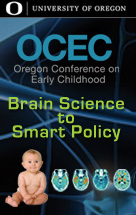 EUGENE, Ore. -- (April 8, 2009) -- Tapping the brain's inner workings -- to understand the good, the bad and how the architecture of the brain can be supported to achieve optimum learning -- is the focus for a "science-to-policy" conference Friday, May 1, at the Oregon Zoo Convention Center in Portland. Five University of Oregon neuroscientists will deliver keynote talks.
EUGENE, Ore. -- (April 8, 2009) -- Tapping the brain's inner workings -- to understand the good, the bad and how the architecture of the brain can be supported to achieve optimum learning -- is the focus for a "science-to-policy" conference Friday, May 1, at the Oregon Zoo Convention Center in Portland. Five University of Oregon neuroscientists will deliver keynote talks.
"The Oregon Conference on Early Childhood will highlight the critical importance of early childhood funding in light of profound evidence of the brain's malleability during the early years and the significant positive return from this type of human capital investment," said psychology professor Jeffrey Measelle, director of the UO's clinical science program and co-director of the infant mental health program.
The conference, which will run from 8 a.m. to 5 p.m., is open to the public. It will be attended by a diverse audience that will include scientists, legislators, agency heads, early childhood policy experts, and civic and business leaders.
"The conference is meant to challenge the inverted logic of our state's and our country's funding of human services," Measelle said. "We spend the lion's share of our public dollars on periods of human development during which the brain has become much less plastic and when the return on our investment is negative."
The five UO faculty who will deliver five of the day's eight keynote addresses are: Helen Neville, holder of the Robert and Beverly Lewis Endowed Chair and director of the UO's Brain Development Lab; Jennifer Ablow, who heads a National Science Foundation-funded project on early risk factors to infant biological and behavioral development; Dare Baldwin, whose research focuses on how to enhance human potential for learning, especially in infants; Philip A. Fisher, who heads a 10-year study funded by the National Institutes of Health that explores the effectiveness of a preventive intervention for maltreated preschool-aged foster children; and Measelle, who studies how biological and psychological characteristics of infants and young children interact with their social environments to predict behavioral and emotional dysfunction.
Ablow, Baldwin, Fisher and Measelle all are members of the UO's emerging Center for Healthy Brain Development. Other keynoters are internationally recognized developmental scientists: Megan Gunnar of the University of Minnesota; Stephen Porges of the University of Illinois at Chicago; and Stephen Suomi of the NIH's National Institute of Child Health & Human Development.
The keynote presentations will focus on brain regulatory systems that are susceptible to early adversity, but also especially responsive to intervention during the early years of life. A moderated round-table discussion with representatives from economics, government and science will follow the talks.
The Oregon Zoo Convention Center is located at 4001 S.W. Canyon Road in southwest Portland off the Sunset Highway (U.S. 26). Registration and more information are available at the OCEC Web site, or by calling 541-346-4570. The deadline to register is Thursday, April 23.